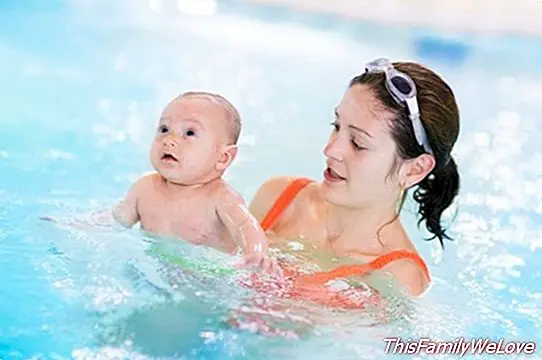Your baby's first dip: games in the water

Contact with water brings many benefits to the baby since it improves his cardiorespiratory capabilities, benefits his muscular coordination and develops his sensory and psychomotor capacities. From the fifth or sixth month, you can give your first dip in the pool.
At what age can I take my baby to the pool?
What month can I take my baby to a swimming school to learn to swim, or at least to float, to avoid unfortunate accidents? This is one of the most frequent questions that parents ask themselves when summer arrives.
They also ask themselves what month they can put in the pool without being affected by chlorine, for example. The first thing you need to know is that from the fifth month, the child finds in the water the possibility of moving trimidensionally, being much greater the freedom and continuity of movements.
It is advisable that from the moment you are born, you start working with him a series of exercises in the bathtub. Normally the baby loves water, since during pregnancy it has remained in the amniotic fluid and, so to speak, water has constituted its natural habit.
It is important to note that the practice of aquatic activity strengthens the heart and lungs of your child, due to the respiratory work done in the water that increases the efficiency of oxygenation and blood transfer.
In the same way, this practice improves and strengthens the affective and cognitive relationship between the child and his parents.
Water learning techniques for babies
The gentle exercises of aquatic stimulation combined with the water at a pleasant temperature relax the baby, at the same time as they stimulate his appetite and make him eat and sleep better. In this way you will improve your character and behavior.
Water stimulation classes usually last for half an hour because they can tire the baby more time. What is mainly worked is the field of psychomotor skills so that the little boy will adapt to the water and begin to see it as something more natural. To achieve this goal, the child will perform a series of exercises always with you, such as leaning your legs against the wall of the pool and doing push-ups; with your hand under your back and your son on your back will strengthen your sense of balance and perform other exercises that on the floor could never exercise.
By using a series of auxiliary materials, such as a rubber belt that makes you float and allows you to perform movements with arms and legs, you will help strengthen and tone muscles.
Psychological and social development of babies
Your baby will feel more secure and will enjoy a lot of aquatic stimulation when he perceives that you are close and that all your attention is focused on him. This, in turn, will increase your sense of independence and self-confidence because even if you do not walk yet, you can move on the water by yourself.
On the other hand, the coexistence in the pool with other children will help you to relate better, besides that you will learn to share and carry out activities with other people, since the child acquires more confidence to communicate and develop in a group, because it will be in permanent contact with instructors and other babies.
Tips to stimulate your baby in the water
1. Never leave your baby alone near water. Although swimming programs teach you to move in it, you must always remain at your side to avoid any fright.
2. Do not establish a certain period of time to achieve the objectives, since each child has its own rhythm, so try to respect the rhythm of your child and never force him to do something he does not want. Do not compare him with other babies as this can harm his development.
3. Always avoid pools of doubtful hygienic control and sanitary because they can be the focus of serious infections.
4. If your child is bad, you should not bathe under any circumstances and do not bring it back to the pool until it is fully recovered.
5. In outdoor swimming pools, protect your baby with a sunscreen high factor and do not expose more than an hour and a half to the sun and water in periods no longer than half an hour.
6. Remember to transmit confidence and confidence to your baby through body contact. Always try to make the pool time fun with fun games to make it a rewarding experience and do not force him to do things he does not want to do.
D. Jesús Abiol.Director of BabyGym Chamartín (Madrid). Center specialist in aquatic activity of babies




